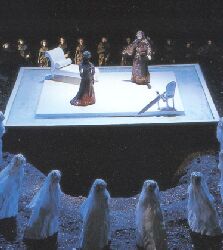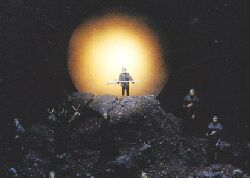I stood for a few moments at the entrance to my aisle to look up into the house as the audience took their seats, hoping to burn the image into my mind for all time. From here the curve of the pit hood allowed one to see the rows of string players in their casual attire awaiting the beginning of Act III Lohengrin with its peppy prelude.
They wailed into it.
During the "Wedding March" I closed my eyes, the better to savor the heavenly voices of the Bayreuth ladies' chorus. Unlike many weddings I have been to, this one wasn't followed by a reception with open bar (my two favorite words) and a room full of relatives dancing the Hokey-Pokey, Birdie Song and Macarena on full stomachs, causing shuddering vibrations to ripple along the floor to my table and forcing me to hold my beers in both hands. Nor was there some huge auntie trying to drag me up into the twirling throng. At such times I usually profess some debilitating infirmity that sadly prevents me from the ecstacy of the dance. On at least one occasion, when my protestations were falling on deaf ears, I was forced to take out my service revolver and shoot myself in the thigh: "Damn! Well I guess that means no Hokey Pokey for me!" I cried before I passed out.
 Lohengrin and Elsa were to spend a night of longed-for intimacy, high on a platform in front of an invited audience of 1925. This square platform had been concealed by a huge (maybe18 ft. square) hollow cube, which was raised into the fly tower to reveal the bridal chamber. The platform was furnished with a white chaise-longue for her and an upright chair for him, against which leaned his sword, lest drunken revellers burst in to drag them out to join a Conga line.
Lohengrin and Elsa were to spend a night of longed-for intimacy, high on a platform in front of an invited audience of 1925. This square platform had been concealed by a huge (maybe18 ft. square) hollow cube, which was raised into the fly tower to reveal the bridal chamber. The platform was furnished with a white chaise-longue for her and an upright chair for him, against which leaned his sword, lest drunken revellers burst in to drag them out to join a Conga line.
The staging kept the singers back from the pit, forcing them to push their voices at times, particularly Roland Wagenfuhrer, the Lohengrin of the evening.
Maybe some champagne, some Tony Bennett wafting in the background would have relaxed them and allowed them to live for the moment, savoring that honeymoon bliss. Tony Bennett wasn't even born at the time Lohengrin was written (I have done my research) and so instead we get right down to the heart of the matter in marriage....the wife cross-examining the husband and the poor fellow doesn't even have a service revolver to accidentally shoot himself in the thigh with to distract her from her pursuit of the truth.
Telramund tried to help out by bursting onto the platform but was felled by a single blow from the sword which Elsa gave to Lohengrin. Telramund fell to the floor on his back , spread-eagled. At this point Elsa and Lohengrin stepped off the platform onto rocks which allowed access and egress and the platform tilted forward, spilling out water which had lain invisible while it was in a horizontal plain. "Alas, all our happiness (and the water) has fled", quoth Lohengrin, but in German.
The stage was thrust into blackness during the stirring orchestral entre-act. My pulse, like the band, was racing. The pit hood, against which my feet were resting, was throbbing from the onslaught of brass, strings and drums down below. I like it loud! And when the lights came back up...."Heil König Heinrich! König Heinrich....HEIL!!" The gust of air from the chorus on that last HEIL parted my hair and I am still wearing it that way.
The highlight of this act, for me, from hereforth, is Lohengrin's Narration or "In fernem Land". A masterpiece. It was almost the undoing of the tenor. He sweated profusely, dribbled and spat saliva and looked and sounded exhausted. It was an ordeal for him, like singlehandledly pushing a piano up a spiral staircase. It is a hard way to make a living.
Gabriele Schnaut spilled the beans regarding Gottfried's disappearance. She has tremendous reserves of vocal power and rivetting stage presence and continues to work in Bayreuth more than 20 years after her debut in the Chereau Ring when she could be earning larger fees elsewhere and peeling the paint of another theatre's walls.
 Gottfried appeared, silhouetted against a rising sun on a hill at the rear of the stage while Lohengrin made his exit down into the depression at the front of the stage which had been a deep watery puddle in Act I. WEH!!
Gottfried appeared, silhouetted against a rising sun on a hill at the rear of the stage while Lohengrin made his exit down into the depression at the front of the stage which had been a deep watery puddle in Act I. WEH!!
The curtain closed and the audience roared and rumbled their feet on the wooden floor. This is an exciting part of the Bayreuth experience: the great acoustic of the room, unbroken by tiers of boxes, overhangs and recesses, makes for an audience sound like no other I have heard, and, sitting in the first row with my friends, we were getting the full effect of the tumult.
After the show, our last, we drove a few hundred yards behind the Festspielhaus to have dinner outdoors at an Italian restaurant, the Burgerreuth. Some of the performers, including Roman Trekel, the stellar Herald, came to dine and were greeted by bursts of applause from the diners. Emily Magee, who had shone so brightly in Die Meistersinger, was spotted by my eagle eye. We chatted with her for a while.
So, musically at least, our Bayreuth sojourn was at an end. Tomorrow would be Sunday and another Dutchman would take to the stage, but for us, Sunday would be a day of rest and time to collect one's thoughts. We were not totally without a schedule, for at 1pm we expected our friends Wolf and Eugene to arrive from Frankfurt.
Exhausted from the cumulative effects of four Wagner performances in a week, and from the beer and great lashings of Italian food, I tumbled into bed and fell into a deep sleep.
To be continued......
ōæō
|
Literary content: Copyright: © 1999 Norris Adair |
| TOP of PAGE |
Welcome Page | Site Map
| Website Design by: |